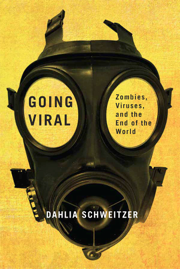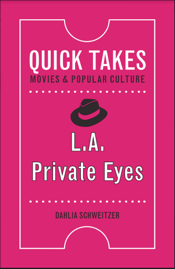
About Dahlia
DAHLIA SCHWEITZER is a pop culture critic, writer, and professor. Described by Vogue as “sexy, rebellious, and cool,” Schweitzer writes about film, television, music, gender, identity, and everything in between. She studied at Wesleyan University, lived and worked in New York City and Berlin, and completed her MA and PhD at the Art Center College of Design and UCLA. She is currently chair of the Film and Media department at the Fashion Institute of Technology in New York City.
In addition to her books, Dahlia has essays in publications including Cinema Journal, Journal of Popular Film and Television, Hyperallergic, Jump Cut, Quarterly Review of Film and Video, and The Journal of Popular Culture. She has also released several albums of electronic music, including Plastique and Original Pickup.

Professor
As a professor of film and media studies, Dahlia exposes her students to a variety of theoretical approaches and cinematic techniques, asking them to approach both with analytical inquisitiveness. Her aim is to pass her own curiosity on to her students, encouraging them to think across their classes and experiences to create intellectual connections between course materials and the world in which they live. She strives to remind her students that the loudest voice is not necessarily correct, and in so doing, helps them find their own.

Media Critic
Declared “one of the world’s leading analysts of popular culture” by renowned author Toby Miller, Dahlia writes about film, television, music, gender, identity, and everything in between. Her work can be found across mainstream, academic, and emergent channels in both long and short form. Repeatedly drawn to popular culture, Dahlia loves to analyze and unpack cultural artifacts in order to explore how they reflect social and historical issues, as well as looking at how they reinforce or interrogate common cultural assumptions.

Author
Dahlia has written numerous books exploring aspects of film and television. Regardless of the topic—serial killers, private detectives, or even zombies—all of her writing engages directly with questions of self versus other, private versus public space, examining depictions of gender, identity, and race. She traces how these depictions evolve and examines what they mean about our changing world. In her latest project, Dahlia explores the ways haunted homes have become a venue for dramatizing anxieties about family, gender, race, and economic collapse.
Blog
Why Hillary’s Logo Really IS as Bad as Everyone is Saying
Hillary Clinton unveiled not only her presidential bid on Sunday but also her new campaign logo -- and general consensus, regardless of political affiliation, is that it's not pretty. But, in all the criticism, one of the crucial things no one is mentioning is what happened last time, back in 2008. Paul Davies, a psychologist turned designer who works with Etch UK, argues that, "If Hillary is successful, it will be forgotten in a good way. And if not, it will just be forgotten." Christophe...
Baudrillard, Fake Boobs, and the Blinding White of a New Set of Veneers
Hyperreality is used in semiotics and postmodern philosophy to describe a hypothetical inability of consciousness to distinguish reality from fantasy, especially in technologically advanced postmodern cultures. Jorge Luis Borges, in “On Exactitude in Science,” wrote of an empire whose ambition to map the entire world in all its detail and variations led it to gradually increase the scope and complexity of its maps. In other words, our society has become so reliant on models and maps that we...
The Dangerous Lesson of Whiplash — And Why I Hated It
My feelings about Whiplash are complex, but one feeling isn't. I hated it. I hated it with a passion. If I had seen it in theaters, I would have walked out. And here's why: Whiplash glorifies a specific aspect of the artistic process -- the grueling, bloody (literally), and masochistic drive to be better than you are, to push harder than body and soul should allow, in order to achieve greatness. The implication being, of course, that if you haven't made it, it's because you didn't really want...




